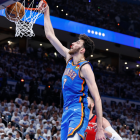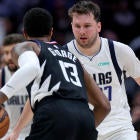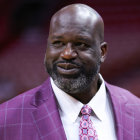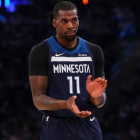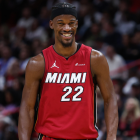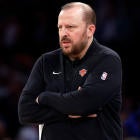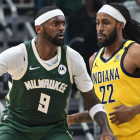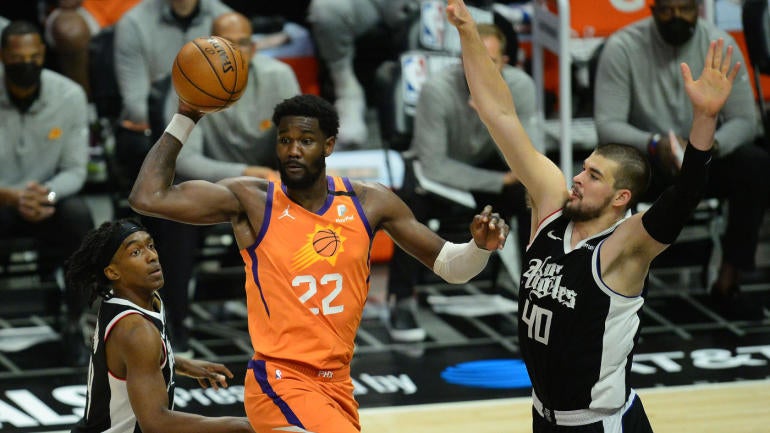
Restricted free agency is much more "restricted" than it is "free agency." The label is attached to most free agents with three or fewer years of experience, and more prominently, fourth-year veterans coming off of rookie-scale contracts that did not agree to extensions in the previous offseason. These free agents are able to sign offer sheets with other teams, but their incumbent employer is allowed to match any offer they receive.
Sounds simple enough, right? The real trouble comes in the two-day period after the offer sheet is signed in which the original team is free to mull its decision over. This poses a significant risk to the signing team. Free agency moves so quickly now that if a team devotes its cap space to a player and then that player is ultimately prevented from signing with them after two days of waiting, the market is unlikely to still have many more worthwhile free agents for them to spend that space on.
So teams take the sure things, and restricted free agents rarely move. Their only real weapon is the qualifying offer teams are forced to make in order to retain their restricted rights. Any player that signs that offer becomes an unrestricted free agent the following offseason with the right to sign wherever he wants… but how many young players are willing to risk life-changing money for freedom of movement? For that reason, many who can't generate an offer sheet opt to take below-market deals with their original teams rather than try their luck with the qualifying offer.
Over the past 10 offseasons, only 20 total restricted free agents have managed to change teams for a contract at or above the mid-level exception. This season? That number could be as high as eight, and while the final total will probably be lower, at a bare minimum, there are two max-level restricted free agents that appear likelier to leave than stay put and several more facing specific circumstances that should facilitate movement.
This is usually the part where I offer some sort of league-wide market trend or shift in organizational thinking to explain this phenomenon… but there really isn't one at play here. In most cases, we're dealing with teams that simply appear to value their players less than the market does. So let's take a look at what might be the greatest class of realistically available restricted free agents. Who's gettable? What's it going to take to swipe them? And where might they go?

CBS Sports HQ Newsletter
Your Ultimate Guide to Every Day in Sports
We bring sports news that matters to your inbox, to help you stay informed and get a winning edge.
Thanks for signing up!
Keep an eye on your inbox.
Sorry!
There was an error processing your subscription.
The max guys
Before getting into the specific players, I'd like to make two macro points:
- A max contract for a restricted free agent is among the safest bets in basketball, and that is especially true right now. A fourth-year veteran is eligible for the lowest max contract bracket, a deal starting at 25 percent of the cap. If he signs it with another team and it is matched, that contract includes only five percent raises annually in an environment in which the cap is expected to rise more than that each offseason. A possible cap spike with the new TV deal in 2025 could turn the end of these deals into bargains, and even if it doesn't, these are young players. You're signing up for their best years.
- Restricted free agency is a great way to burn bridges with your best players. In 2014, the Utah Jazz refused to give Gordon Hayward a max deal, but they matched the one Charlotte gave him. Three years later, he was gone. That same offseason, the Spurs refused to extend Kawhi Leonard's contract after he won Finals MVP. Instead, they made him wait until restricted free agency in 2015 so they could artificially deflate his cap number and preserve space for LaMarcus Aldridge. Four years later, he was gone. Denying players money they think they've earned is a great way to lose them as soon as they're free to leave.
So let's dive into our two obvious flight risks: DeAndre Ayton and Miles Bridges. Ayton's agent explicitly stated that he wanted a max contract last offseason. The market is expected to produce such an offer this offseason. ESPN's Adrian Wojnarowski reported, word for word, that the Suns "do not value Deandre Ayton at a max contract." Things aren't quite as clear for Bridges. He didn't warrant a max offer last offseason, but was a Most Improved Player candidate this time around. Now, The Athletic's Shams Charania reports that the Hornets are hesitant to match a max offer sheet. With Gordon Hayward and Terry Rozier already on hefty multi-year deals and a long-term LaMelo Ball extension looming, the notoriously thrifty Hornets might simply lack the resources to pay Bridges what the market suggests that he's worth.
Are they actually worth the max? There are compelling arguments in either direction. Both will probably be offered it simply because the market demands it. If one interested team doesn't, three others will. But the end of Ayton's postseason left a sour taste in Phoenix's mouth, and his shot-creating ambitions have felled far more talented centers (see Howard, Dwight). Bridges is a high-end wing defender in theory only at this point. His 3-point shot is hardly stable either. Paying either the max is paying them for the player you hope they'll be. That's not abnormal. Phoenix and Charlotte don't appear eager to make those bets.
So who will? Detroit stands out as the likeliest home for Bridges. The Pistons seemingly eschewed better draft compensation in a Jerami Grant trade because Portland offered the ability to absorb him without sending back salary. The move was a fairly transparent bid for cap space, and with Jalen Duren added with the No. 13 pick, Ayton doesn't seem an all too likely target. There's a gaping hole at power forward for Bridges to fill here. Indiana could snake its way into the proceedings as well, but Detroit is the early frontrunner.
The Ayton sweepstakes are a bit harder to parse. Phoenix wants to orchestrate a sign-and-trade, and unless Ayton's preferred destination is a cap space team, he's going to have to cooperate with them to get the contract he seeks. So if a team like Atlanta (something around Clint Capela and/or Onyeka Okongwu?) or Toronto (Gary Trent Jr.?) makes an offer far better than the field's, that's likely where Ayton is headed. Keep an eye on Portland as well. Even after acquiring Grant, the Blazers could generate a bit of leverage by waiving Eric Bledsoe and trading Josh Hart to open up cap space. That also takes us to another major restricted free agent.
Could Portland offer up Anfernee Simons in a double sign-and-trade for Ayton? They just drafted Shaedon Sharpe as a possible long-term replacement, and while many teams would likely prefer to deal for the teenager on a rookie contract, Phoenix's disinterest in potential would likely steer the Suns towards Simons, who just averaged 17.3 points per game in a breakout season. Such a swap would deprive Portland of its secondary scorer, but it would get Damian Lillard the pick-and-roll partner he needs and force Sharpe to play real minutes from the start.
Such a deal would be enormously complicated from a cap perspective. Base-year compensation treats only half of the player's new cap figure as outgoing salary in sign-and-trades, and both the Suns and Blazers have to contend with this issue. But if the Blazers want Ayton badly enough and use their potential to generate cap space as a leverage-generating mechanism, there might be something here.
The starters
Allow me a paragraph or two to shamelessly advocate for Collin Sexton. In NBA history, only 14 players have ever scored 24 or more points per game on 57 percent true shooting or better before the age of 23, and 13 of those players are either in the Hall of Fame already or on a clear Hall of Fame trajectory. The 14th player is Collin Sexton. Think about the criticisms lobbed his way. He posts empty stats. He's not a playmaker. He doesn't defend. Weren't those same barbs once hurled at Devin Booker? Because he's on this list.
That doesn't mean Sexton is as good as Booker. It does mean that he probably still has untapped potential in the right environment. Booker became Booker when he started playing next to Chris Paul. What happens if Sexton finds his own Paul? He probably won't this summer if his $20 million asking price is to be believed. No player with his reputation is going to make that much coming off of a torn ACL. So here's a prediction: if Sexton doesn't find a sign-and-trade (and the guard-needy Wizards look like a possible landing spot), he takes the qualifying offer and picks a new home next offseason. It's entirely possible that he's traded before that. Cleveland added Caris LeVert at the deadline in part to serve as Sexton insurance.
Speaking of rotational logjams, Orlando has more bigs than it knows what to do with. Wendell Carter Jr. is coming off of a breakout season and has been extended. Jonathan Isaac is presumably coming back. Franz Wagner can play any front-court position but wherever he lands, he's going to eat up a ton of minutes. Paolo Banchero will probably eventually play some small-ball five. So where does that leave Mo Bamba?
The same traits that once had Kristaps Porzingis labeled a unicorn are present in spades for Bamba. He does two things very well: block shots and make 3s. He did both more than 100 times last season, and you can count on one unicorn horn the number of his contemporaries who matched the feat. It was Bamba and Jaren Jackson Jr. Nobody else. Jackson is more mobile and offensively versatile. That's why he's about to start a $100 million contract. Bamba won't get that much, but he does the two most important things a center can do better than practically any other center in basketball. He shouldn't be too far off. If the Pacers would rather trade Myles Turner than extend him, Using their cap space to snatch Bamba as a replacement would be a wise pivot.
The mid-level candidates
Marvin Bagley III isn't getting mid-level money on merit, but his Detroit bounceback warrants something more than a minimum for teams willing to invest in his development. After getting buried in Sacramento, the Pistons took a flier and were immediately rewarded with career-highs in true shooting percentage and effective field goal percentage. Turns out, leaving the Kings tends to help players.
Watch for Bagley's "restricted" status to be removed shortly. As a former No. 2 overall pick, he has an absurd $28.3 million cap hold that would prevent the Pistons from using their cap space if they actually planned to extend him a qualifying offer. They likely won't, but don't be surprised if they turn around and offer him a short-term deal with their cap room mid-level exception. Such an investment from a similar team would be warranted provided that team is ready to prioritize his growth. Most teams should feel better about their developmental infrastructure than Sacramento.
Speaking of shenanigans in Sacramento, Donte DiVincenzo may not be thrilled about being there! Kings reporter James Ham suggested in April that his camp believed that Sacramento specifically kept him on the bench to minimize his free-agent value. To be honest, DiVincenzo did a good enough job of that himself. He shot 35.1 percent from the field for the year, and while his body might have recovered from the ankle injury that knocked him out of the 2021 postseason, his defense certainly did not.
The Kings have coveted DiVincenzo for quite some time, missing out on him in the 2021 offseason during the Bogdan Bogdanovic debacle. They finally have him, but keeping him could be difficult. His long-term market has taken a substantial hit over the past year, so his best play is probably to take the qualifying offer, rebuild his value with the Kings next year, and then hightail it out of Sacramento in the summer of 2023. Of course, if he gets a long-term offer he likes this offseason, it might be worth trying to take it. The Kings let Bogdanovic walk in 2020 even after the Hawks offer a sign-and-trade. We can't say for certain what motivated the Kings to pass on Jaden Ivey, but he didn't seem especially enthused about the idea of playing in Sacramento. Only the Kings could cultivate a reputation for letting go of good players just because they asked nicely, but there's some evidence to suggest that this organization simply does not want players that don't want to be there.
But enough Kings bashing for one story, let's pivot to one of the NBA's better organizations. Lonnie Walker IV has always been better in theory than reality. He has the physical tools, but they've never translated to steady NBA production. His defense remains below-average, and his shooting numbers have dipped significantly as his volume has risen. The best version of him has the ball a lot more than San Antonio appears interested in giving it to him, but the Spurs were just a 34-win team. If they don't have shots for him, not many teams will.
The Spurs tend to keep their own players, but if his $13.3 million cap hold gets in the way of their cap space ambitions, it wouldn't be terribly surprising to see him jettisoned. One of the lottery teams with space would be a good fit, though even Orlando is running out of developmental guard minutes to offer.
The fliers
Let's speed-round through some restricted free agents that probably won't make much more than the minimum, but have bargain potential:
- Josh Okogie owes a real debt to the Gary Payton IIIIs and Bruce BrownBrowns of the world because blank offensive slates that can defend like hell are in vogue right now. Everybody is going to be looking for their lump of defensive clay to mold into a passable offensive player, and Okogie fits that bill to a tee. He's as close to Gary Payton defensively as you're going to find for minimum money, but offensively he's something closer to Gary Oldman.
- Cody Martin is due for the 2019 Alex Caruso flavor of "not quite the minimum but not far off" raise, something in the neighborhood of $7-8 million total over two years. His shooting finally started to come around last season, and his brother Caleb's breakout in Miami surely caught some eyes.
- A more athletic version of Kevon Looney is hiding somewhere inside of Nic Claxton's often frustrating game. You aren't going to find better switching and rebounding out of a center for the price Claxton will ultimately command, but even a Nets team with three Hall of Fame ball-handlers and a fourth coaching the team hasn't yet figured out how to use him in pick-and-roll. He likes to shoot jumpers and he has some ball skills, but his NBA future is really going to depend on whether or not he can start comfortably catching lobs and finishing dunks.
- Amir Coffey is a bucket and Steve Ballmer is way too rich to let him go. He's going to be a bargain, but he's near the bottom of the list because we know with relative certainty that he's going to be a Clippers bargain.
- Juan Toscano-Anderson is a 15th man only because he's a Warrior. His offensive limitations are going to keep him out of playoff rotations, but his defense and energy make him a perfectly viable regular-season player.
- Yuta Watanabe plays every minute like he's chasing the love of his life through an airport. I haven't posted a clip once in this entire 2,800-word story but I'm going to do it for literally the last player because if you've made it this far, you deserve to see this.
This has happened like a dozen times over the past two years and if somebody doesn't give him steadier minutes for our league pass enjoyment, I'm going to have to look into raising some capital and just buying a team myself.















